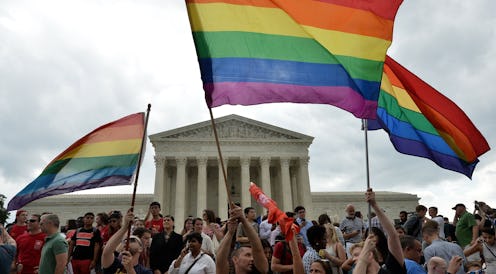Life
Why SCOTUS Referencing Confucius Is So Relevant
Today the Supreme Court made history by declaring marriage bans to be illegal, and naming marriage as a constitutional right, regardless of sexual orientation. In the ruling, Justice Anthony Kennedy writes that the “annals of human history reveal the transcendent importance of marriage,” and cites ancient philosophy, as well as the history of literature and art to prove that marriage is fundamental to “the human condition.” For example, Justice Kennedy references Confucius, writing, “Confucius taught that marriage lies at the foundation of government.”
Confucius was a highly influential Chinese philosopher who lived between 551 BCE and 479 BCE in present day Qufu, in eastern China. His teachings emphasize morality, justice, self-discipline, and leadership through example. His work comments on the interrelation of government and family, which seems especially relevant today, as the government declares the validity of families born from same-sex relationships.
Today’s ruling is certainly not the first time SCOTUS and Confucius have crossed paths. In fact, there is a marble statue of Confucius on the Supreme Court Building itself, standing alongside sculptures of Moses and the Athenian statesman, Solon. Confucius is famous for his aphorisms, quick sayings that manage to capture essential ethical and social principles. Read on for 6 other Confucius quotes that are pertinent today:
“Never impose on others what you would not choose for yourself.”
This is Confucius’s famous version of “The Golden Rule,” and it seems especially important today: Treat others as you want to be treated (i.e. Never impose a marriage ban unless you would be willing to impose one on yourself.)
“The man who moves a mountain begins by carrying away small stones.”
The mountain: Marriage equality across the nation. The stones: The small, but no less important, battles for equal rights that people have fought in their home communities and states.
“It does not matter how slowly you go as long as you do not stop.”
The fight for marriage equality had plenty of setbacks along the way. Advocates did not stop.
“To put the world in order, we must first put the nation in order; to put the nation in order, we must first put the family in order; to put the family in order; we must first cultivate our personal life; we must first set our hearts right.”
The family and the nation are inextricable.
“The Master said, ‘A true teacher is one who, keeping the past alive, is also able to understand the present.’”
In his opinion, Justice Kennedy acknowledges that marriage as traditionally been viewed as a union between people of the opposite sex. But even as he recognizes that history, the court's decision acknowledges that things change, and that the law has to evolve according to life as it is now, not as it was in the past.
“They must often change who would remain constant in happiness and wisdom.”
The recognition that marriage is not static is central to Justice Kennedy’s ruling. He writes, “The history of marriage is one of both continuity and change. That institution—even as confined to opposite-sex relations—has evolved over time.”
Images: Getty Images(3)
